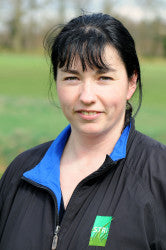Soaraway temperatures create heat stress conditions
 Hot temperatures are raising the stress levels for turf and turf managers. New research has shown Primo MAXX applications can ease the stress on turf and, with turf staying green and playing better for longer, reduce stress on turf managers too.
Hot temperatures are raising the stress levels for turf and turf managers. New research has shown Primo MAXX applications can ease the stress on turf and, with turf staying green and playing better for longer, reduce stress on turf managers too.
Soil temperatures are set to hit over 22°C in the midlands this week, creating conditions of extreme stress on turf plants. Air temperatures close to 30°C forecast on www.greencast.co.uk will result in premature shutdown of plant respiration.
Research at Rutgers University in the US has shown that when temperatures rise above 18°C turf root growth is reduced, increasing susceptibility to drought and damage. Above 24°C at turf level leaf growth is adversely affected, leading to browning and die back with increased risk of disease.
 Trials have shown that Primo MAXX applications before periods of drought stress can increase the chlorophyll content in the leaf by 60% and enhance the levels of beneficial bioactive cytokinin that delays the onset of drought effects, and ensures turf remains green and healthy for longer.
Trials have shown that Primo MAXX applications before periods of drought stress can increase the chlorophyll content in the leaf by 60% and enhance the levels of beneficial bioactive cytokinin that delays the onset of drought effects, and ensures turf remains green and healthy for longer.
Holding turf in growth regulation through hot summer days also reduces the plant's respiration rates and stomatal evapo-transpiration, which significantly improves water efficiency. In practice irrigation requirements can be reduced by up to 30%. Research has shown Primo MAXX also enhanced photochemical efficiency of turf under stress conditions by over 75%.
Dr Ruth Mann of the Sports Turf Research Institute reports that applications of Primo MAXX inhibit the production of gibberellic acid in the grass plant, which reduces cell elongation. "Leaves are therefore smaller, with less leaf area for transpiration, making the plants more water efficient and less susceptible to drought stress.
"Furthermore, when gibberellic acid levels are reduced, grass plants naturally increase their level of abscisic acid. This abscisic acid alters the osmotic potential of stomatal guard cells through the movement of potassium, causing them to close thereby reducing transpiration during drought stress."
Dr Mann advocates sequential Primo MAXX applications, to keep the turf in regulation mode, which have been shown to produce an increased level of cytokinin in turf grass. "These cytokinins improve the plant's drought tolerance, helping to produce better quality of turf during summer months. Suppressing vertical leaf growth also encourages plants to increase root growth, making them better able to seek out any available moisture."
 Syngenta Technical Manager, Dr Simon Watson, highlights that reducing the mowing requirement by up to 50% through the summer months further reduces stress on plants and staff. "The daily cut on greens is far faster with fewer clippings to box off and can be completed before it gets too hot and the course gets busy," he says. "The cut on Primo treated greens is also cleaner giving better presentation, and with less growth during the day they play more consistently through to the evening."
Syngenta Technical Manager, Dr Simon Watson, highlights that reducing the mowing requirement by up to 50% through the summer months further reduces stress on plants and staff. "The daily cut on greens is far faster with fewer clippings to box off and can be completed before it gets too hot and the course gets busy," he says. "The cut on Primo treated greens is also cleaner giving better presentation, and with less growth during the day they play more consistently through to the evening."
Primo MAXX application improves turf density and playing surface quality through the summer, enabling green keepers to raise cutting height whilst still maintaining or improving green speed. "This also serves to reduce stress on the turf, helping to maintain a better root system for stronger growth and faster recovery, as well as reducing the risk of Anthracnose and other turf disease attack," he advises. Where turf is under stress and only growing slowly at the time of application, turf managers may consider reduce Primo MAXX rates by up to 50%, he adds.
Primo MAXX can be bought from the Pitchcare Shop
On Primo treated fairways, Dr Watson reports the mowing requirement may be halved - saving labour, money and wear and tear on machinery. Independent studies by Cranfield University have shown course managers can save up to £5500 a year with the use of Primo MAXX programmes.
Dr Simon Watson
Syngenta Crop Protection
Tel: 01223 883441
Email: simon.watson@syngenta.com
For turf specific information visit the web site www.greencast.co.uk
